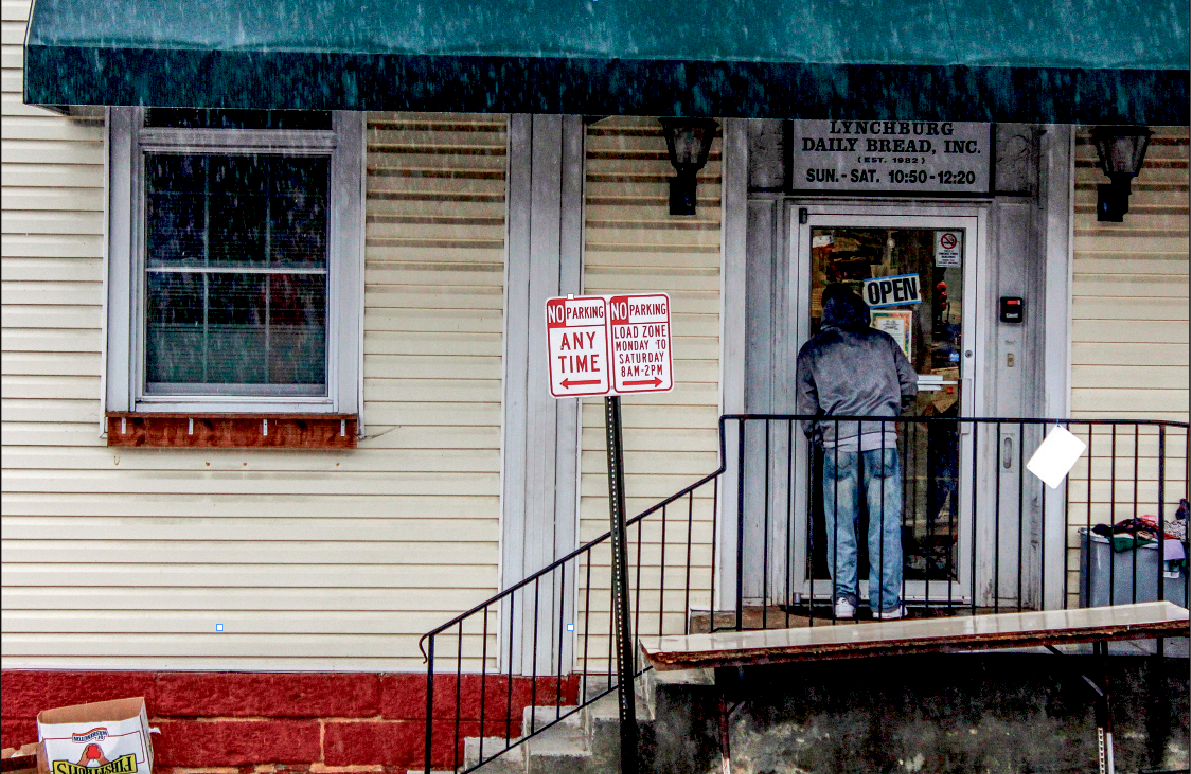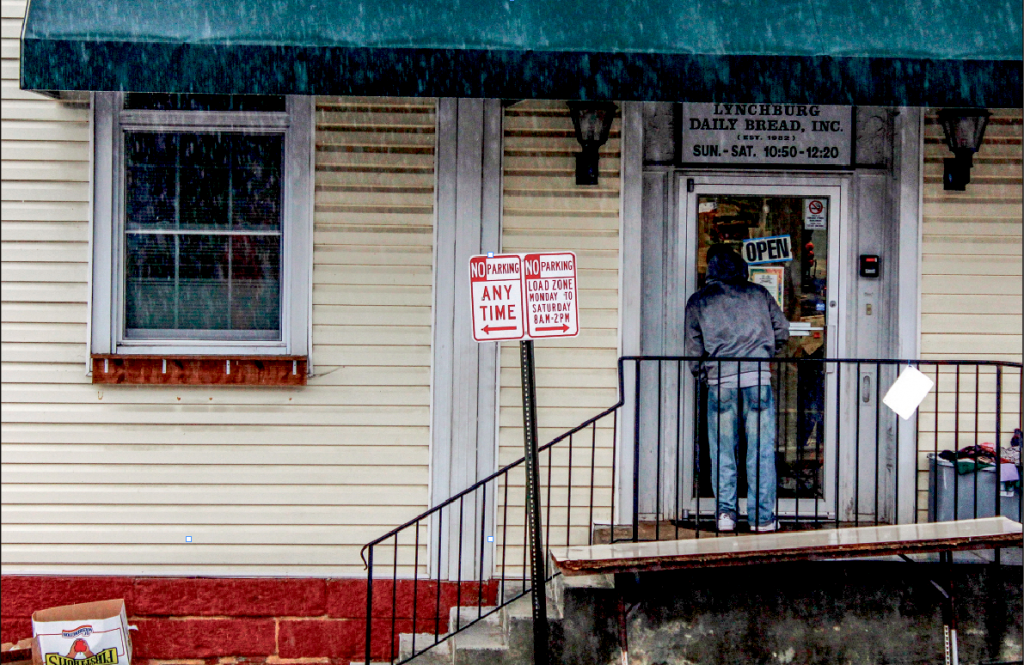Lynchburg poverty rate hits record high, city introduces new initiative to provide job opportunities and support
For the past 20 years, the residents of Lynchburg City have witnessed a relentless increase in poverty that has bolstered the city’s homelessness, left more children hungry, normalized malnutrition and made many working-class families desperate to make ends meet.
The most recent data available, collected last December by the University of Virginia’s Demographic Research Group, reveals that nearly one in four (24.7 percent) residents in Lynchburg City live in impoverished conditions.
According to the U.S. Census Bureau, the national definition for poverty is receiving an annual income less than $12,082 for individuals and $15,391 for couples.
Compared to the other 133 registered counties and cities across Virginia, Lynchburg’s poverty rate is the 13th highest, putting it in the 90th percentile of highest poverty rates in the state. Comparing Lynchburg’s poverty rate to the national scale reveals that it is nearly twice as large the national rate (13.5 percent).
As opposed to Lynchburg’s number of impoverished residents, the number of poor U.S. citizens per capita is not only relatively small but also decreasing
steadily. The U.S. Census Bureau reported that 3.5 million U.S. citizens were raised out of poverty in 2014, shrinking the national poverty rate by 1.3 percentage points in a year (14.8 percent to 13.5).

HELPING HAND — The Daily Bread soup kitchen in Lynchburg feeds, on average, 150 people a day. Will Young | Liberty Champion
The same report from the U.S. Census Bureau estimated Lynchburg’s poverty rate is the highest ever in recorded history. Statistics show that Lynchburg’s current poverty rate grew by four percentage points since the 2010 U.S. Census was taken and a staggering 9.4 percentage points (38 percent increase) since the 2000 U.S. Census was taken.
To address the steady influx of poverty, the Lynchburg City Council is currently considering a three-pronged strategy that is based off a collaborative model where governmental and non-governmental corporate entities work together to provide apprenticeship opportunities to low-earning local workers.
“A lot of people are working but are still living in poverty because they have three children and are making minimum wage at McDonald’s,” Lynchburg City Manager Bonnie Svrcek said. “We want to get those people who are willing and motivated into jobs where they have a benefits structure and can be a pipeline for the future workforce for local companies.”
Such opportunities, Svrcek said, may include connecting unemployed and underemployed residents with entry-level positions at Centra, RR Donnelley, Porter Fabrication and other locally-based companies that could offer potential workers mentorship and education of a particular skill.
The city council’s plan also looks to assist children of impoverished families through case management and hopes to build a network of support groups through poverty awareness dialogues that could help individuals and families in poverty with any given need.
The dialogues on poverty, Svrcek said, would run very similarly to the dialogues on race and racism that the city hosted eight years ago, where the city engaged approximately 1,000 residents split up in 8-12 person study circles in discussion over race relations. Svrcek said she believes awareness is key to getting the community involved in the project.
“Lack of awareness is absolutely a problem,” Svrcek said. “It’s important to use the dialogue to educate people on what poverty looks like in our community because a lot of people who’ve never experienced poverty don’t understand it.”
For the past two fiscal years, Lynchburg has designated $50,000 to initiatives fighting poverty, and the latest initiative will not demand additional funding, according to Svrcek. She said she does not feel limited by the budget because she believes most of the pieces are already in place, and all that is left to do is conduct a focused plan.
The plan will be spearheaded by Lynchburg’s assistant city manager, a recently vacant position that was formally assigned to John Hughes IV as of Friday, Dec. 2. Svrcek said she is willing to designate 50 percent of Hughes’ time to launching the poverty initiative.
The goal of the initiative – which will be discussed further and explained formally at Lynchburg Mayor Joan Foster’s State of the City address in February – is to move 50 families out of poverty per year for the next five years. When the city of Greensboro, North Carolina tried a similar
approach to poverty, they were able to move 18 families out of poverty in 18 months.
“I know 50 is an aggressive and optimistic goal, but heck, give me a goal, and we’re going to shoot for it and do the best we can,” Svrcek said.
If the city’s goal is achieved, it would be a drastic change of pace compared to recent years. Tracey Dixon, executive director of local soup kitchen Lynchburg Daily Bread, said there has been a steady increase in the number of guests at their facility since its start 34 years ago, especially in the number of children.
Nearly 70 percent of children registered within Lynchburg City public schools are eligible for free and reduced lunch, according to statistics from the Virginia Department of Education. During the holiday season and summer when students are not able to be provided food from their school, Dixon said Daily Bread sees an upswing in child guests.
Daily Bread is Lynchburg’s largest soup kitchen and on any given day feeds lunch to an average of 150 people. In 2015, that equaled to serving a total of 53,475 meals, approximately an 80 percent increase in meals served annually from when Daily Bread served nearly 10,000 meals in the years after it opened.
Having been the executive director of Daily Bread for five years, Dixon said she believes the core of Lynchburg’s poverty problem is not about getting unemployed residents into hired positions. According to the U.S. Census Bureau, Lynchburg saw a 1.7 percent increase in employment from 2013-2014, yet continues to see an upsurge in poverty.
Rather, Dixon said, the problem is that many of the guests who come into Daily Bread do not have a long-term mindset, and because of it, they fail to prepare for the future and invest in opportunities that would be able to raise them out of poverty.
“Unlike college students who are planning for their future, the guests here are trying to get through today,” Dixon said. “When you’re in that sort of crisis mode, it’s very hard to get a long-range view.”
Daily Bread guests Robert Newberry and Bridget Romano said they recently moved to Lynchburg and were hired relatively quickly, but have not been paid by their employer yet. To save money, they said they regularly come to Daily Bread for lunch when they’re not working to save money.
“Where we’re from there’s no place that will give you a leg up,” Newberry said. “Here, it feels like they generally care.”
Many other humanitarian organizations like Daily Bread, including the Salvation Army and Central Virginia Continuum of Care, have worked together to limit the impact poverty has on an individual or family. When looking at the number of homeless as a measure, it seems to be working. At the last count there were only 237 homeless people in Lynchburg and surrounding areas.
That said, there was no change in the number of homeless from 2014 to 2015. Addressing the poverty issue head-on, Dixon said, is the next step in creating radical change for the residents in the Lynchburg area – many of whom see no clear way out.
“Times are hard out there,” a guest at Daily Bread, who wished to stay anonymous, said. “Some of us are out here just living on faith. This is us living on faith. When God says he will provide needs like food, he will, just like he is here.”
YOUNG is the news editor.
